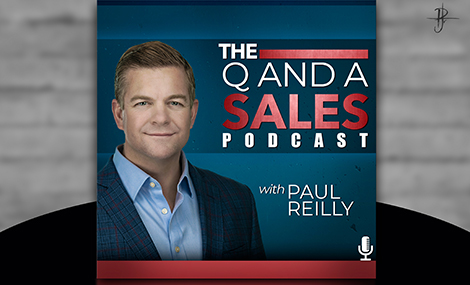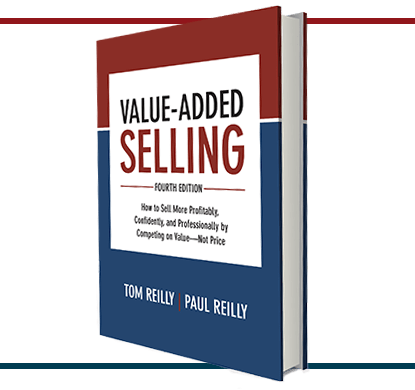Paul extols the benefits of taking time for reflection and restoration during the last week of the year.
Show Notes
Burnout is real. Take a break and start the new year with all your gas in the tank.
You deserve to enjoy the fruits of your labor. You’ve earned it.
Take the time to tap into your deeper purpose.
Find your motivation for the new year by reflecting on your progress through the outgoing year.
Stop waiting to be happy. Happiness is a choice you make.
Visit www.ToughTimer.com to get started on the 30-Day Tough-Timer Challenge!
Order your copy of Selling Through Tough Times from Amazon or Barnes & Noble!
Click here to purchase the latest edition of Value-Added Selling!
***
Thank you for tuning in. Our show is updated weekly with the questions you ask. So, please go to the home page to ask the question that you want answered.
Thank you to our production team at The Creative Impostor Studios.
Be sure to follow our show in your favorite podcast app and share this episode with a colleague or friend.
And most importantly…make it a big day.
Why should I take a break and unplug?
(Transcribed from podcast)
Well, as you listen to this episode, we are getting ready to wrap up 2021. And I know many people are eager to get 2021 in the rearview mirror and are looking forward to 2022 and all the opportunities that 2022 will bring. It’s going to be great. So, the question we’re going to talk about today, though is, “Why should I unplug?” I know that towards the end of the year, many sales leaders, many salespeople, they are hustling to close as many deals as they can. They’re trying to generate some momentum. But what I want to talk about is that that last week of the year, you know, right in between Christmas and New Year’s. And what I would recommend is to completely unplug. Take off work. Don’t make a single sales call. Use this time to really just unplug and reflect. And so, we’ll talk about that and the reasons as to why.
And I know many of you might be thinking, “Paul, what are you thinking? How could I completely take off a week—completely unplug?” Believe me, you can do it, and it’s critical that you do so. So, let’s get started: Why should I unplug?
Before we get into answering that question just a reminder, remember, Selling Through Tough Times is available. It’s a great way to kick off your new year. If you have a sales team that is going through some challenging times, hey, pick up a copy of the book. Pick up a couple of copies for a salesperson that you know is struggling. This book is your go-to guide for building resilience and profits in any downturn.
So, let’s talk about number one. Why should I unplug? Burnout is real. Something that happens to people when we operate, with salespeople rather than when we operate at our absolute best all year long, and we do that year-in and year-out, it can be a complete grind and we can experience burnout. So it’s important that we unplug towards the end of the year, just to avoid that. We want to make sure we’re starting January all the gas in the tank. We want to make sure that we are completely full and ready to go. And the best way to do that is to take a break and unplug.
And I know many of you might be thinking, “You know, Paul, that’s great. I want to take a break, but too many breaks and you’re broke.” And that’s true as well. Right? So, we want to make sure that we have taken this time—that we use our vacation time—because what will happen is, if we don’t take a break, if we don’t take a break and unplug, we burn out and that’s when bad things can happen. So, make sure you unplug.
Number two. Another reason why you should unplug is you deserve to enjoy the fruits of your labor. What’s the point of working hard all year long if we can’t enjoy it. So, you deserve this. You’ve earned this. Remember that, that you have truly earned this. You know, it’s interesting. There’s this guy on LinkedIn, Dan Price. And he was, famously, the guy who established, I think it was like the $70,000 minimum wage. And, I don’t agree with everything this guy has to say by any means. He’s a pretty controversial guy. You can see some of his posts on LinkedIn. But there is one thing he mentioned that I wholeheartedly agree with. And that is, your company gives you vacation days because they want you to take these vacation days. There is no merit in burning yourself out and looking back 20 years from now and saying, “Oh, I wish I would have taken more vacation.”
Take the time that you have earned. You deserve it. Enjoy the fruits of your labor. That’s why. That’s why you need to unplug as well. And another thing, to hit that point just a little bit harder. Here’s what happens when you give and give and give and grind and work as hard as you possibly can, and you don’t take a break, you start resenting your work, you start resenting your boss, you start resenting the people, the colleagues, you work with. You’re jealous of the people that do take time. So, make sure you take the time just to enjoy the fruits of your labor.
Now, another reason why we need to unplug—this gives you an opportunity to tap into your deeper purpose. When we think about it, it can be challenging to find our purpose in life and, not to get too philosophical by any means, but when we’re constantly, every day, hustling and grinding, you know, sometimes we wonder, “Okay, what’s the deeper purpose in all of this? What am I really doing here?” And if you can take some time just to unplug, especially towards the end of the year, when many of us are celebrating Christmas or other spiritual holidays, it gives us a time to reflect and connect with our deeper purpose. If you’re going to find that connection, you need to limit your noise. You need to make sure that you’re fully present so that you truly can even give yourself that opportunity to connect and find that deeper purpose. So, unplugging again, that’s going to give you the opportunity to do that.
And then also, during this time—this time where you’re unplugging—you can reflect upon the year. I love this time of year because it helps with reflection where we look at to where we have been, where we started the year, where we’re at now, the progress that we made. It’s absolutely a wonderful time to reflect on that progress, because a couple of things happen when you reflect on your progress: number one, you identify ways that you can improve—what you can do better. But also, it motivates you. Progress equals motivation. That’s one of the premises of this great book, The Progress Principle, where they talk about small wins and how that progress keeps us motivated. So, what could be more motivating than looking back and reflecting upon a year and saying, “Okay, here’s where I started. Here’s where I’m at now.” Look at that progress that you have experienced. That’s not your true potential, by the way. That just shows you how far you’ve come. And then you can look into the future and say, “Okay, I’m going to be able to go even further.” So that progress that you’ve experienced, it can motivate you.
Now, a thought—as you’re reflecting on your year, reflect on the progress that you’ve made, not the progress of others. When we think about reflection, it’s so tempting to want to look at other people and what they have created, what they’ve accomplished. But the only thing that’s going to do is either make us feel prideful, boastful that we’ve accomplished more than them, or we’re going to look at that and we’re going to feel disappointed about what we’ve accomplished. And neither one of those are really a positive emotion. The only person we need to compare ourselves to is who we were yesterday.
I just finished a great book called The Gap and The Gain. And I highly recommend this book. It’s by Dan Sullivan and Ben Hardy. And in this book, they talk about how you’ve got this gap, and then you’ve got gain. And the gap mindset is about comparing yourself to other people, their achievements; and the gain is really about comparing your progress that you’ve made. And it’s so much more positive to be in the gain mindset than the gap mindset. And this whole book gives you tips and ideas on how to do this. I highly recommend it. What a great book to read, you know, besides Selling Through Tough Times, as we go through the end of this year. But, pick up your copy we’ll have a link to that book in the transcript of this podcast.
Final thing I wanted share with you is to stop waiting to be happy. Stop waiting to be happy. That happiness can be a choice that we make. And I know that for many of the podcast listeners, you know, maybe you’re in your twenties, maybe you’re in your thirties, your forties, you’re in your fifties or sixties or wherever you are in your career, there’s a temptation to say, “You know what? I’ll be happy when….” “I’ll be happy when I get that big deal.” “I’ll be happy when I get that promotion.” “I’ll be happy when I win that large deal.” Whatever it is, we have this misperception that the happiness we seek is in the future. And we’ve got to remember that every day we experience things that could potentially bring us joy and happiness. We have family. We have friends. We have so many blessings, so many things in our life that should make us happy if we choose to focus on them. Happiness is not some future state that we strive for. Happiness is something that we can find every single day. We just have to choose happiness.
All right, folks. Well, as we wrap up 2021, I wish you all a Merry Christmas, happy holidays, and a wonderful new year. I look forward to catching up with each and every one of you into the next year.
Make it a big day.


